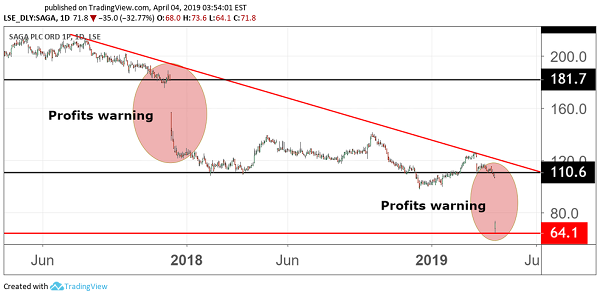Saga savaged as dividend sacrificed
Offering services to the over-50s isn't as profitable as it was, and Saga is taking drastic action.
4th April 2019 12:42
by Graeme Evans from interactive investor
Offering services to the over-50s isn't as profitable as it was, and Saga is taking drastic action.

A savage dividend cut and 35% slide in share price represent the biggest blow yet for Saga (LSE:SAGA) investors after five years of stock market underperformance from the over 50s specialist.
The fall-out from today's profits warning and bottom-line loss left Saga shares trading at another record low of 68p, compared with the 185p price seen in May 2014 when retail investors were left disappointed by their allocations in an over-subscribed IPO.
Many have stayed on board in the hope that Saga could weather its recent insurance-related storms, helped by the lure of a dividend yielding in the region of 8%. A high number of City "buy" recommendations also highlighted the long-term attraction of the stock.
That promise is now in tatters after the total dividend pay-out was cut 55.6% to 4p, based on a reduction of the final dividend from 6p to just 1p. This reflects Saga's expectations that profits for 2019/20 will now be between £105 million and £120 million, some 40% below UBS forecasts and down from the £180.3 million reported in annual results today.

Source: TradingView Past performance is not a guide to future performance
The downgrade partly reflects the challenges facing its insurance broking operation, which will now focus on selling a more differentiated offer directly to customers rather than attempting to compete on price.
It is planning a range of innovative features, such as a new approach to renewal pricing where premiums are fixed for three years if there is no change in a customer's circumstances.
Lance Batchelor, who has been CEO since March 2014, said Saga had lost sight of what had made it successful in the first place, such as competitively-priced products specifically designed for its demographic and which built strong brand loyalty.
He said:
"In the more commoditised parts of the insurance and travel markets, our customers are now able to buy basic and cheap products very easily online. The end result has been a steady decline in the number of customers over a period in which our demographic has grown."
While the travel division has performed in line with expectations, with a fifth successive year of profit growth to £21 million, Batchelor said Brexit was putting a "clear dampener" on customers' willingness to commit to holidays in 2019. As a more niche travel provider, his aim is for Saga to grow travel margins in line with "best in class specialist travel companies".
He added that since the IPO, Saga had reduced net debt by more than £300 million, replaced IT platforms and designed and built a new cruise ship with a second on its way.
And while he conceded that today's changes would be painful in the short term, it was the right course of action for customers and shareholders in the longer term.
Investors, however, might be forgiven for thinking they've heard much of this before, given previous initiatives from Batchelor have included the pursuit of a "fresh and younger" brand image and a plan in December 2017 to set aside £10 million for growing customer numbers.
And while today's plans for a more differentiated offer makes sense, analysts had been warning for some time that Saga's brand strength was not sufficient on its own to insulate the insurance division from competition from the likes of Admiral (LSE:ADM) or Hastings Group (LSE:HSTG).
UBS analysts predicted today's hefty profits warning and goodwill impairment of £310 million would increase focus on Saga's management. They added: "This is now the third time Saga has clearly disappointed the market since coming to the market. We already sensed significant market concerns around management execution, which we now expect to be higher."
The UBS "buy" recommendation and 150p price target is now under review. The broker points out that Saga's guidance for a pay-out ratio equivalent to 50% of earnings, rather than 50% to 70% previously, pointed to a dividend yield of around 4%.
Numis Securities added: "We think the company's realisation that it needs to change its model to compete effectively in today's insurance marketplace offers some hope that insurance broking profits can be stabilised at the lower level now expected for the 2020 financial year, albeit with significant execution risk."
*Horizontal lines on charts represent levels of previous technical support and resistance. Trendlines are marked in red.
These articles are provided for information purposes only. Occasionally, an opinion about whether to buy or sell a specific investment may be provided by third parties. The content is not intended to be a personal recommendation to buy or sell any financial instrument or product, or to adopt any investment strategy as it is not provided based on an assessment of your investing knowledge and experience, your financial situation or your investment objectives. The value of your investments, and the income derived from them, may go down as well as up. You may not get back all the money that you invest. The investments referred to in this article may not be suitable for all investors, and if in doubt, an investor should seek advice from a qualified investment adviser.
Full performance can be found on the company or index summary page on the interactive investor website. Simply click on the company's or index name highlighted in the article.